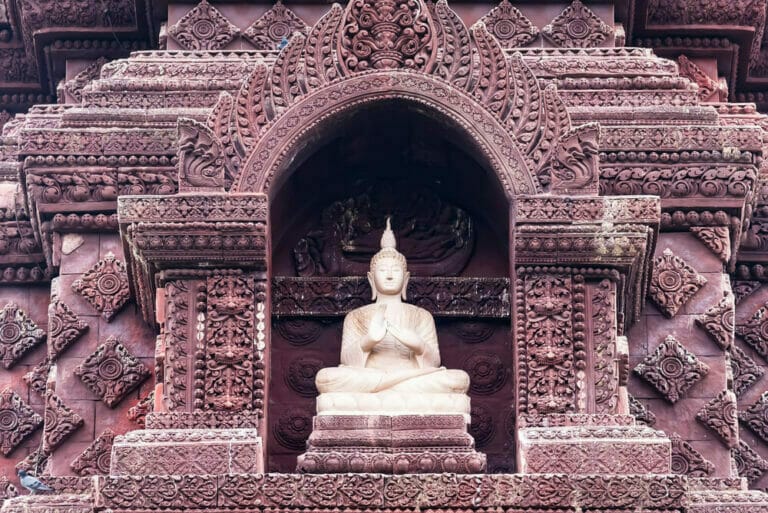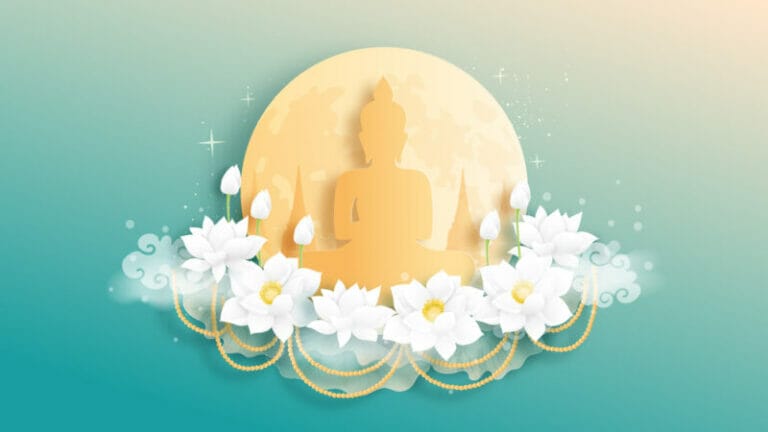Is Buddhism a Pessimistic Religion?
Buddhism is a widely recognized religion with a global following of around 520 million practitioners.
It also holds the distinction of being one of the oldest philosophies, dating back to the 6th century BCE.
Despite its popularity and longevity, Buddhism is often misinterpreted as promoting a negative or overly complex view of life.
Some people perceive it as promoting a negative and pessimistic view, and as a religion that tells people to avoid pursuing materialistic things and encourages them to strive for a simple life.
However, there is much more to Buddhism than this limited perception. This blog will explore the various aspects of Buddhism and demonstrate how it does not necessarily promote a pessimistic view of life.
Why Do So Many People See Buddhism as Pessimistic?
Buddhism is a practice which focuses on aligning oneself with one’s true nature through meditative and religious practices.
By doing this we can accept new notions and ideas without clinging either rigidly or not at all. We can weed out what belongs in our world from what does not belong, thereby improving the efficiency of the choices we make because there’s less indecision involved in them.
That’s why when Buddha said everything is impermanent (and therefore stress-inducing) because everything changes all the time, people were like “What?!” Because most people cannot accept the transient nature of existence so they seek permanence.
And yet achieving true happiness or inner peace has always come down to accepting what is regardless of whether you like it or not.
To understand why Buddhism is often seen as pessimistic, we need to start with a look at the Buddha’s words themselves.
In the very first teaching, he presents the Four Noble Truths, which outline the core of his philosophy.
Not only does the first noble truth state that life is suffering, it goes on to say that this is a direct result of an illusion we all have about the way the world is.
The Buddha teaches that we all share the same universal sufferings such as aging, sickness and death.
When the Buddha talked about suffering, he talked about people suffering from disease, old age, and death. He talked about suffering from finding a desired object, and then finding that object lost.
He talked about suffering from not being able to get what you want, or from being separated from what you already have. In short, he talked about suffering from the pain of life’s impermanence.
Everything is in flux, decaying, sickening, disintegrating, perishing. Even the earth is not exempt, it too will one day vanish.
It is an unfortunate fact that we all experience suffering and unhappiness to a certain extent. Buddhism teaches us not to fear this truth and to face and accept it.
For many people, accepting or acting on these truths is difficult. As a result, it’s likely that most people perceive Buddhism as preaching a pessimistic or complicated view of life.
Why Is Buddhism Pessimistic?
Buddhism is pessimistic in the sense that the Buddha drew a picture of human life that is painful and filled with sorrow.
In a society where people are encouraged to strive for happiness at all costs, the Buddhist emphasis on suffering can sound a bit pessimistic. Hence, a lot of people mistakenly think that Buddhism is all about suffering.
Buddhism is often perceived as pessimistic due to the fact that it teaches its followers to accept the fact that life is full of suffering.
However, it is important to understand that this does not mean that Buddhism is pessimistic. In fact, Buddhism actually teaches the best methods to deal with the hardships of life.
Buddhism teaches that by understanding the truth of suffering, we can learn to end it. When we realize that our suffering is self-inflicted, we can learn to stop causing it.
This may be seen as complicated, but accepting reality is often more helpful than denying it.
Why Did Schopenhauer Think Buddhism Is Pessimistic?
Arthur Schopenhauer was a famous German philosopher who did not believe in real happiness. He introduced Buddhist thought through his writing to Europe. He became famous for being an advocate of pessimism.
He is mostly known for being a skeptic arguing that complete happiness was not attainable in this life. Pessimism was one of the defining characteristics of his writing.
He considered true happiness to be practically impossible given man’s irrational desires and fallible nature.
Instead, he saw it as our duty to find ways to reduce suffering in ourselves and others – yet ultimately even this will be temporary relief because humans are incapable of permanent satisfaction due to the constant growth-and-decay cycle inherent in life.
Schopenhauer emphasized the power of the will against the intellect. The aim of life, according to Schopenhauer, is happiness.
For this reason, he thought that rationality is often an obstacle to attaining happiness because it makes people think that they can attain it through things like wealth or aesthetic satisfaction rather than through willpower.
To put up with our lot in life we must see the world as will and idea: constantly striving and agonizing at the same time.
For Schopenhauer, happiness was about avoiding misery and not about attaining something positive. Happiness in his view was increased when someone is in circumstances which he likes, but circumstances can change.
I think that the core truth of Buddhism is perhaps masquerading as a statement. That central statement is this: Nothing stays the same for two consecutive moments. Not even one second.
This idea that we find happiness only in the passing experience of pleasure, that we can never truly be happy, runs through much of Schopenhauer’s work and permeates his conclusions.
According to Schopenhauer, because of the nature of the will, when all things that give us pleasure are accomplished through our power, then boredom sets in.
This state results in emptiness and longing. Boredom comes from completion or attainment of our wishes.
Buddhism does not promote an emotional attitude towards life; instead it promotes an unemotional approach to living.
The significance of an attitude of complete ‘detachment’ cannot be overemphasized by either Schopenhauer or Buddhist teachings.
He viewed suffering as an innate part of our existence and it doesn’t matter what you try or do that suffering will be a part of it in some way, shape, or form which ultimately is something that must be accepted by others for one’s own sake so as to live with it rather than fight against it.
Schopenhauer is influenced by his familiarity with the Buddhist teachings. The emphasis on freedom from pain is plainly very Buddhist in its tone.
There are ways to handle this suffering – for instance through limiting one’s desires. Perhaps this is why Schopenhauer thought Buddhism recognized humanity’s pessimistic traits.
Is Buddhism Really Pessimistic?
Buddhism is often criticized for perpetuating a very pessimistic view of the world. The basic teachings of the Buddha suggest that life is inherently intertwined with suffering from birth to death. This can leave people feeling very discouraged!
However, the Buddha does not intend to end here; this is just the start of his teachings. Ultimately, he explains that there are remedies available to anyone willing to tread a different path in search of happiness and fulfillment.
In fact, the Buddha taught that seeing things for what they are can be liberating if one can put aside attachment to temporary pleasures and aspirations.
Buddhism teaches that there are several steps people can take to overcome the illusion of the world and begin the process of transforming their karma to a more positive fate.
So in actuality, Buddhism is not pessimistic. Buddhism is realism. The pessimist sees only the suffering in life and ignores the joy. The realist sees suffering and joy both.
When you can see the world in a more realistic way, you start to see more clearly the truth of life, the meaning of life. As a result of this enlightenment, one can live a more meaningful life.
Buddhism does not advocate that one should live a life of unhappiness and misery. The main goal of Buddhism is to end suffering and lead a life of happiness and contentment.
Why Is Buddhism Not Pessimistic?
A misconception that leads to suffering is the belief that things have identity, are fixed entities. Things are impermanent, creating more suffering when they’re made into something more than what they are.
The best way to get rid of this mistaken perception of reality is by acknowledging truth.
Some may see this as pessimistic or complicated, but this acceptance of truth is an important part of Buddhist teachings.
Buddha, the founder of Buddhism, is said to have realized that there is suffering in life. It means rather than being attached to things, we must have detachment. Reality is anatta!
In a previous post, I discussed anata in great detail: Anattā (The Easy-to-Read Version)
It means that nothing has an identity whose foundations defy change from one moment to the next.
The Buddha said that nothing has a self. Throughout your day, even during conversations or while reading this article, your thoughts are changing every single moment.
Nothing can be held onto as though it will never change or pass on regardless of how we think it should appear to us.
Rather than holding tightly to an image of ourselves which we believe is solid and constant regardless of what we see, we break down our mental conceptions and attachments so as to declutter our minds.
Is Buddhism Optimistic?
Buddhism is quite optimistic in the sense that it claims that suffering is not inescapable. The Buddha suggests that suffering comes from the fact that we crave things that are beyond our control, particularly our own survival.
And so, by working on ourselves, we can stop suffering. The Buddha doesn’t just present suffering as ‘inevitable’. What’s more, he claims that suffering can be stopped, or at least reduced significantly. This is quite optimistic.
Obviously, the idea of suffering as part of all life can seem very negative. But that is only the starting point. The Buddha goes on to talk about how to solve that problem.
Buddhism looks upon the world as something to be transcended. From this claim, he argues that there must be a way out for this suffering.
This is all a part of the process of reforming the entire human condition. When people understand the truth about life, they can begin to work toward a better life.
In this way, Buddhism is a very optimistic philosophy in that it sees a bright future if people follow a certain way of life.
Also, the Buddhist theory of reality recognizes that there is no permanent, unchanging essence to ourselves or the universe. This means that nothing is ultimately worthy of attachment, aversion or views.
This view is called “not-self” or “emptiness”. It is very positive, since it frees one of attachments, aversion and views.
The Buddha went on to preach several things that can be seen as very optimistic. The Buddha said that there is a way out from suffering, the way is the Noble Eightfold Path.
The Noble Eightfold Path is a guide that shows a single way out from suffering.
The religion promotes the cultivation of good ethical conduct, good mental discipline, and eventually helps people develop their full potential.
What Are the Buddha’s Prescriptions for Being Happy?
Buddhism is rooted in universal principles that are designed to bring peace of mind to practitioners. And when one takes these practices seriously, their life will be changed for the better in ways they might never have imagined.
This is a comment on Buddhism that its central teaching, that people should recognize suffering in their lives, is pessimistic.
If you know a practicing Buddhist, you’ll likely find them to be one of the most cheery and cheerful people you know! They usually don’t have the tendency to take life too seriously or even too easily offended or angry because they have seen past the temporary aspects of life and truly understood one’s impermanent nature. They look so happy-go-lucky!.
For example, the Dalai Lama, who is the global face of Buddhism and its guiding force in today’s world, exudes serenity, which can be attributed to his key principle that one must rid the self of all delusions. I can’t help but notice his smile every time I look at him.
| Reading recommendation: | Why Is the Dalai Lama Always Smiling?: A Westerner’s Introduction and Guide to Tibetan Buddhist Practice [*Amazon] |
The Buddha realized that it is a natural tendency in all humans to cling to things. We want what we don’t have and we want to hold on to it. This clinging, the Buddha says, is the very cause of our dissatisfaction.
In fact, it’s the cause of all of our problems. The Buddha gives numerous explanations for this. He says that clinging leads to anger and hatred, which in turn leads to more clinging, and so on.
The more we cling, the more we have to lose, and the more we have to lose, the more we have to suffer. It’s a vicious cycle.
Samsara is the wheel of rebirth. It’s a wheel that keeps spinning. It brings one life after another. And in each new life, you can get it better or get it worse.
Can you see the pattern here? When we cling, we suffer. When we let go, we can change our perceptions, thereby reducing the experience of suffering.
Buddha advocated the middle path, between the extremes of self-indulgence and self-mortification.
Buddhism can be looked at in different ways, but most people understand it as the pursuit of spiritual enlightenment. Buddhism is about the knowledge of becoming. It’s about the path to enlightenment.
Parting Words
The Eastern teachings are starting to enter the domain of spiritual ideas of western culture. These practices have spread throughout North America, making it easier to reconcile with everyday life.
It is very surprising that there are so many Westerners who have accepted the Buddhist practices even though they didn’t grow up in a religious family.
This would imply that there is some power behind these ideas that transcend the cultural background of the followers, making Buddhism an attractive set of practices for individuals who are searching for personal development or enlightenment.
While Western culture is highly embedded in the motto of “me, myself and I” (aka consumerism), it seems that there is a growing trend towards Buddhist philosophies and ideals, such as peace and peace of mind, stopping to worry about things that don’t concern you.
Perhaps this stems from people’s desire to essentially lead a healthier lifestyle.







